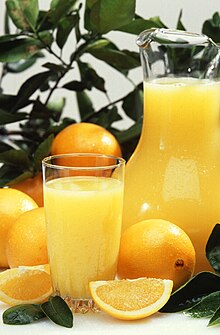| Revision as of 01:26, 20 September 2004 view sourceEequor (talk | contribs)15,921 editsm Recategorize.← Previous edit | Revision as of 09:00, 3 November 2004 view source Edward (talk | contribs)Administrators94,533 editsm dab ConcentrateNext edit → | ||
| Line 5: | Line 5: | ||
| '''Orange juice''' is the liquid obtained by squeezing or pressing the interior of an ]. It is enjoyed as a ] in many parts of the world. It is sometimes referred to by the abbreviation "O.J." | '''Orange juice''' is the liquid obtained by squeezing or pressing the interior of an ]. It is enjoyed as a ] in many parts of the world. It is sometimes referred to by the abbreviation "O.J." | ||
| The largest ]er of orange juice is ], followed by ]. Orange juice is commonly exported in dried form and infused in the destination country. Juice which is shipped in liquid form is traded as "direct juice" between producers. It is sold to consumers (in the USA) with the label 'Not from Concentrate'. | The largest ]er of orange juice is ], followed by ]. Orange juice is commonly exported in dried form and infused in the destination country. Juice which is shipped in liquid form is traded as "direct juice" between producers. It is sold to consumers (in the USA) with the label 'Not from ]'. | ||
| Fresh orange juice generally has a fruity and pleasantly ]ic taste. It contains a high amount of ] (]). Some manufacturers add ] or ascorbic acid to their products, in addition to other nutrients such as ] and ]. | Fresh orange juice generally has a fruity and pleasantly ]ic taste. It contains a high amount of ] (]). Some manufacturers add ] or ascorbic acid to their products, in addition to other nutrients such as ] and ]. | ||
Revision as of 09:00, 3 November 2004
For the Scottish band, see Orange Juice.

Orange juice is the liquid obtained by squeezing or pressing the interior of an orange. It is enjoyed as a beverage in many parts of the world. It is sometimes referred to by the abbreviation "O.J."
The largest exporter of orange juice is Brazil, followed by Florida. Orange juice is commonly exported in dried form and infused in the destination country. Juice which is shipped in liquid form is traded as "direct juice" between producers. It is sold to consumers (in the USA) with the label 'Not from Concentrate'.
Fresh orange juice generally has a fruity and pleasantly acidic taste. It contains a high amount of vitamin C (ascorbic acid). Some manufacturers add citric acid or ascorbic acid to their products, in addition to other nutrients such as Calcium and Vitamin D.
Category: